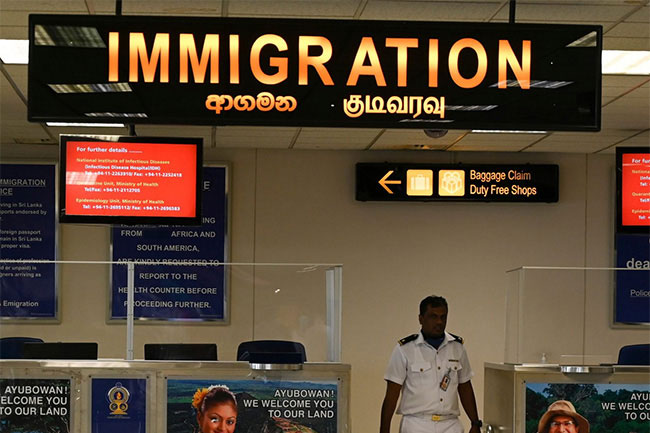January, 2, 2025

By Joshua Perera
Joshua is an experienced writer, editor, and researcher and has a background in fact-checking, investigative journalism, and debunking misinformation.
Sri Lanka, renowned for its stunning landscapes, rich culture, and warm hospitality, is witnessing a resurgence in tourism after years of challenges. As the sector begins to recover, it is crucial to consider sustaining this growth for long-term economic benefits. One key aspect for such growth will be the country’s visa regime, where a more flexible and diverse system will attract a larger range of travellers and maximize economic gains.
The Need for a Diversified Visa System
A diversified visa system tailored to different traveller needs can make a significant impact to unlocking Sri Lanka's full tourism and economic potential. For instance, long-stay tourist visas can attract retirees and long-term travellers who wish to spend extended periods in Sri Lanka, contributing significantly to the local economy. These visitors often spend more on accommodation, dining, and local services, providing a steady stream of revenue for local businesses.
With the rise of remote work, digital nomad visas is a newer category that many countries are now introducing to specifically cater to remote workers and professionals who will spend long-term on accommodation, food, and local services. For example, Estonia and Barbados have successfully implemented digital nomad visas, attracting thousands of remote workers who contribute to the local economy.
Adventure tourism visas can attract thrill-seekers interested in activities like surfing, hiking, and wildlife safaris, promoting niche tourism markets. Countries like New Zealand and Costa Rica have capitalized on their natural landscapes by offering specialized visas for adventure tourists, resulting in increased tourism revenue and global recognition as top adventure destinations.
Business visas also play a crucial role in attracting foreign investment to the country. Streamlined processes for investors can encourage foreign direct investment, creating jobs and stimulating economic growth. Entrepreneur visas can attract startup founders and innovators, fostering a vibrant business ecosystem. Specific visas for project-based consultants can facilitate business operations, ensuring that skilled professionals can contribute to short-term projects without bureaucratic delays. For instance, the United Kingdom's Innovator Visa has attracted numerous entrepreneurs, leading to the establishment of new businesses and job creation.
Embracing a New Era of Tourism
Implementing a multi-tiered visa system can yield significant benefits for Sri Lanka, including increased tourism revenue, foreign investment, and economic diversification. Countries like Malaysia and Australia provide compelling examples of how diverse visa categories can drive economic growth.
Boosting Tourism Revenue: Malaysia's visa exemptions for Indian and Chinese nationals have significantly boosted tourism, with visitor numbers from these countries increasing substantially. This influx of tourists has led to higher spending in the hospitality, transportation, and retail sectors, directly benefiting the local economy. Similarly, Australia's diverse visa categories, including the Temporary Skill Shortage Visa, have successfully addressed labour shortages and attracted skilled workers. This has not only boosted tourism but also supported various industries by filling critical skill gaps.
Attracting Foreign Investment: Simplified business visas and investor-friendly policies can encourage foreign direct investment. For example, the Schengen visa policy in Europe has streamlined travel processes, contributing significantly to the continent's $1.2 trillion tourism industry. This policy has made Europe an attractive destination for both tourists and investors, demonstrating the economic benefits of a flexible visa system. By adopting similar policies, Sri Lanka can attract foreign investors, leading to job creation and economic growth.
Enhancing Competitiveness: Adopting a modern and flexible visa system will position Sri Lanka as a more attractive destination compared to regional competitors. The success of countries like Turkey, which has seen increased tourism from countries like China and Russia due to its diverse visa policies, underscores the importance of visa facilitation in boosting tourism and economic growth. By offering a range of visa options, Sri Lanka can cater to different traveller segments, enhancing its competitiveness in the global tourism market.
The Importance of a Robust Visa Platform
A successful visa system requires a robust and secure technological platform that ensures efficient processing, tracks visa holders, and prevents overstays. A secure digital platform can effectively monitor entries and exits, enhancing national security. Sri Lanka has faced issues with visa overstays and illegal foreign-run businesses, particularly in coastal towns popular among tourists. Addressing these issues through a robust visa platform can prevent such problems and ensure compliance with the laws of the country.
Online application portals and efficient processing systems will reduce bureaucratic hurdles and improve the overall traveller experience. This can be seen in the success of countries like Australia and Malaysia, where streamlined visa processes have facilitated easier travel and business operations. Additionally, a robust visa platform can provide valuable data on traveller demographics and trends, enabling informed policy decisions and targeted marketing campaigns. This data can help Sri Lanka tailor tourism offerings to meet the needs of different traveller segments, further boosting the sector's growth.
Modernizing Sri Lanka's visa system is not just about attracting more visitors; it's about strategically positioning the nation for long-term economic growth and prosperity in a competitive global landscape. Embracing a diversified visa regime will not only enhance the country's appeal to a broader range of travellers but also drive sustainable economic development, making Sri Lanka a leading destination in the global tourism market.
Video Story